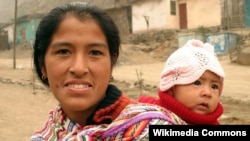A certain style of caregiving during a child’s first years can result in better social and academic success well into adulthood, new research finds.
Previous studies have shown that "maternal sensitivity" in the first years of life produces children who are more likely to do better in school and have better social relationships in adolescence.
But does the apparent benefit of maternal sensitivity continue into adulthood? That’s what K. Lee Raby, a post-doctoral researcher at the University of Delaware, wanted to find out.
"Maternal sensitivity" is a bit hard to define, but Raby gave an example: when a youngster wants to do something that the parent knows is just beyond the child’s ability. Sensitivity in this case is the degree to which the parent did not do the task for the child, but was positively engaged.
The parent "was supportive of them, was affirming them, was praising them for the things they were doing well. And when they weren’t solving the problem accurately, were kind of warmly and sensitively redirecting them toward the solutions," Raby said in a telephone interview.
Drew from longitudinal study
Raby and his colleagues used a decades-long study started at the University of Minnesota in the 1970s. It began with more than 200 women who were about to have their first child, and it has continued to follow those children for more than 30 years, keeping track of their education, jobs, marriage and other indicators of success.
The children were videotaped interacting with their mothers several times during their first three years of life. The tapes were then analyzed to see if the parents displayed maternal sensitivity in their caregiving. And that was compared with how the children fared as they grew into their 20s and 30s.
"What we found," Raby said, "was the effect was not just observed during childhood and adolescence, but persisted into adulthood, both for social functioning as well as academic outcomes. And that the overall effect, the size of the effect, didn’t appear to be decreasing across time."
Disadvantaged backgrounds
All of the people studied in this research were born into challenging circumstances. Most of their mothers were unmarried. Half were teenagers. All were poor.
So, one message of Raby’s research is that even disadvantaged parents can give their children a strong start.
"Since we know that there are interventions and programs out there that can help parents provide more sensitive care, I think one of the important implications for us as a society is making sure that those parents have easy access to those services," he said.
The study by Raby and his colleagues is published online by the journal Child Development.




